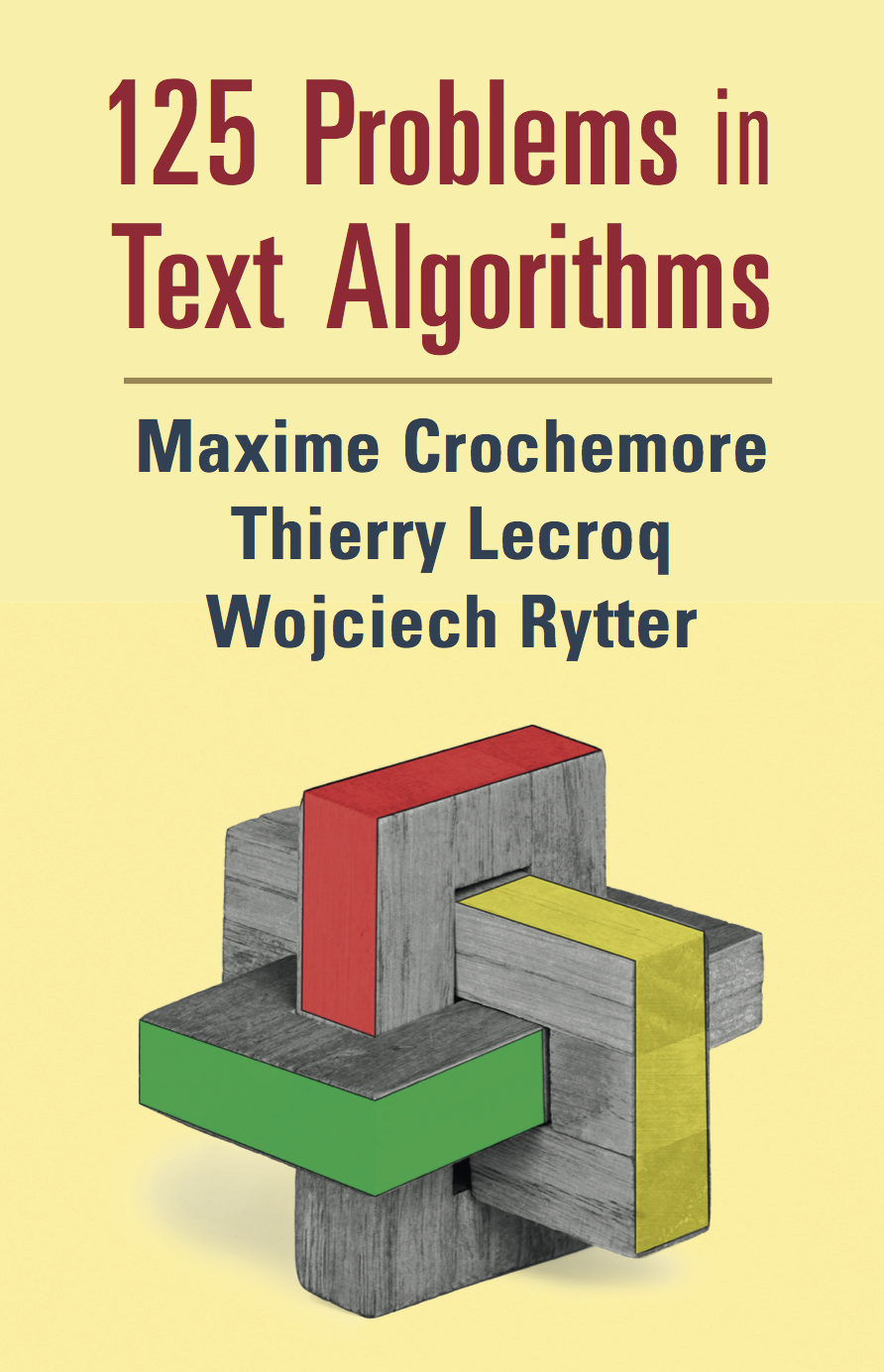Example
\(
\def\sa#1{\tt{#1}}
\def\dd{\dot{}\dot{}}
\def\head{\mathit{head}}
\def\tail{\mathit{tail}}
\)
The set $\mathcal{N}_3=\{\sa{000},\sa{001},\sa{011},\sa{111}\}$
is avoidable, since $(01)^{\infty}$ has no factor in $\mathcal{N}_3$.
But after moving the last $\sa{1}$ to the beginning we get the set
$\{\sa{000},\sa{100},\sa{101},\sa{111}\}$ that is unavoidable.
$w=\sa{0101110}$ factorises as $\sa{01}^2\cdot \sa{110}$,
$\sa{01011}\cdot \sa{10}$ and $\sa{010111}\cdot \sa{0}$ over its Lyndon
prefixes $\sa{01}$, $\sa{01011}$ and $\sa{010111}$ respectively.
Its special decomposition is $\sa{01011}\cdot \sa{10}$,
$\head(w)=\sa{01011}$ and $\tail(w)=\sa{10}$.

|
Problem 122: Unavoidable Sets via Lyndon Words
|

|
Lyndon words often surprisingly appear in seemingly unrelated problems.
We show that they appear as basic components in certain decompositions, which
are the main tool in the problem.
The problem deals with unavoidable sets of words.
A set $X \subseteq \{\sa{0},\sa{1}\}^*$ is unavoidable if any infinite
binary word has a factor in $X$.
To start with, let $\mathcal{N}_k$ be the set of necklaces of length $k$,
$k\gt 0$. A necklace is the lexicographically smallest word in its conjugacy
class.
Each necklace is a power of a Lyndon word.
Observation 1.
If $X\subseteq \{\sa{0},\sa{1}\}^k$ is unavoidable then $|X| \geq
|\mathcal{N}_k|$.
Indeed, for each $w\in\{\sa{0},\sa{1}\}^k$, length-$k$ factors of
$w^{\infty}$ are all conjugates of $w$ and at least one of them should be in
the unavoidable set $X$.
The first question provides a more flexible
condition to be unavoidable.
Show that if for each necklace $y\in\{\sa{0},\sa{1}\}^*$, $|y|\geq 2k$, the
word $y^2$ contains a word in $X\subseteq \{\sa{0},\sa{1}\}^k$ then $X$ is
unavoidable.
An ingenious construction of an unavoidable set is based on the notion of
pre-primes.
A pre-prime $w$ is a prefix of a necklace.
Observation 2.
A pre-prime is a prefix of a power of a Lyndon word.
The observation justifies the special decomposition of a pre-prime $w$ as
$u^ev$, where $u$ is a Lyndon word, $e\geq 1$, $|v|\lt |u|$ and $u$ is the
shortest possible.
Head and tail of $w$ are defined by $\head(w)=u^e$ and $\tail(w)=v$.
Note that $v$ is not necessarily a proper prefix of $u$, that is, $|u|$ is
not usually the period of $w$.
It is clear that such factorisation of a pre-prime always exists.
The factorisation is the key-concept in this problem.
Show that there is an unavoidable set $X_k\subseteq \{0,1\}^k$ of size
$|\mathcal{N}_k|$.
Consequently, $|\mathcal{N}_k|$ is the smallest size of such a set.
Consider words of the form $\tail(w)\cdot\head(w)$.
References
J.-M. Champarnaud, G. Hansel, and D. Perrin. Unavoidable sets of constant
length. IJAC, 14(2):241-251, 2004.


